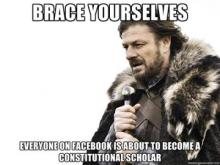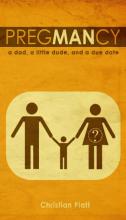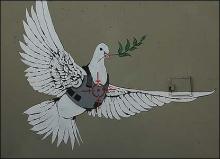Children
How do you get your kid to care about social justice? Well, you can bring her to marches and protests on important issues before she’s old enough to walk; croon her to sleep with freedom songs; or fill her Christmas stocking with fair-trade goodies.
My parents did all that when I was little. Some of my earliest memories involve talking to homeless people in my neighborhood, attending demonstrations with my church, door-to-door lobbying with my mom, even dressing up as Winnie the Pooh on a couple occasions to raise awareness about corporate child labor practices. But these events were just the side effects of having activist Christian parents; they say little about our family life and my own formation as a young person.
Perhaps one of the keys to social justice parenting is to ignore the question above. You can’t get your kid to care about social justice issues. Much like you can’t force your child to be a Christian, to dress a certain way, or to listen to certain music, you can’t set out with a goal to shape your child’s passions and interests. Parents who do this either get lucky or, more likely, meet strong resistance from their young ones. My father tells me that the question parents should continuously ask themselves is this: How can I reflect a vision for a more just and compassionate society within my family?
The goal of social justice parenting is not to produce the “right” kind of child—it is to create an environment in which love flourishes and the structures of family life are consistent with a vision for a better world. In my family, this meant that we functioned democratically (or, to my 4-year-old mind, with everyone “on board”). For the most part, we made decisions at weekly family meetings in which everyone had an equal opportunity to participate. My parents tried not to use age, education level, and income as trump cards for important family matters. That is, we rarely heard the phrases: “Because I said so,” or, “Because I know more than you do,” or “Because it’s my money.”

Brace yourselves. I’m about to step on a soapbox.*
Much as I’d like to go all armchair-Constitutional-scholar and argue that access to affordable health care SHOULD be in the same category as education, fire-fighting, and law enforcement, I’m not going to.
I’m just going to tell you what has happened in MY family.
February, 2005, California
Pregnant with first child. Am on crappy private insurance that costs like $500 a month in premiums but covers almost nothing. Calculate that cost of having child will be approximately half our yearly income.
Freak out.

Within the next couple of weeks the Supreme Court will rule on the constitutionality of Arizona’s anti-immigrant law, SB1070, which mandates racial profiling by police officers and deputizes them to act as an extension of ICE (U.S. Immigration and Customs Enforcement).
Since the passage of SB1070, states across the country have introduced copycat measures into their state legislatures. Chief among them was Alabama’s HB658—the most draconian measure of them all. The crafters of HB658 intentionally pushed immigrants to the point where life was so miserable in their state that they chose to “self-deport.”
This week our nation is witnessing a new level of low. Even as we await the Supreme Court’s ruling on states’ rights to pass their own immigration laws, some Senate Republicans are arguing for two sets of federal legislation even worse than the state bills. These new federal bills aim to take money and food from children—American children.
 It started with a few pieces of construction paper.
It started with a few pieces of construction paper.
If you’ve been following my blog at all over the past few months, you know that Amy and I recently moved our family from Southern Colorado, where we planted a church eight years ago, to Portland, Oregon. Though we’re still doing ministry, it’s a completely different kind of work. Now we’re at a 133-year-old church in the heart of the city. The facility is incredible and the history of the church spans generations. But with that comes a good deal more administrative work than either of us is used to.
We found a preschool for Zoe right away. In fact, the first day she told us that we needed to leave and let her do her school thing. She’s the kind of kid who blooms wherever she’s planted. Mattias, our eight-year-old son, is a little more complicated. Aside from him having Asperger’s, the schools here don’t get out for a couple of weeks yet. This means not only that he has no other kids his age to play with, but also that the typical summer activities we could enroll him in don’t start until mid-June. The result: he gets to spend some pretty long days with us at the church.
Most times, he makes the best of it. He’s figured out how to navigate the labyrinthine halls by scooter, and he has plowed through more cartoons on the iPad than is healthy, I’m sure. But we have to work and we have no other options for him. So far, we’ve all managed.
But yesterday afternoon, he’d had enough. He looked up from his chair on the other side of Amy’s desk with tears filling his eyes. “Mom,” he said quietly, “I’m so bored.” There are plenty of adjectives that describe Mattias, but quiet isn’t one of them. So you know when his voice reduces to a whisper, he is really being sincere.
Amy came down and stuck her head around the corner into my office. “We’re going across the street to throw paper airplanes in the park, she said. “want to come?”
Image by Feng Yu/Shutterstock.
 There is a dangerous marketing strategy when it comes to food and our children. No, it’s not “sugar” or “fat” or even promotions of “low sugar” or “low fat."
There is a dangerous marketing strategy when it comes to food and our children. No, it’s not “sugar” or “fat” or even promotions of “low sugar” or “low fat."
Most of the food-marketing ploys aimed at kids are contributing to the soaring rate of obesity.
Here’s why, and here’s why it is so personal to me.
I’ve told my story many times of how I struggled with being overweight as a child and teen. The problem wasn’t “baby fa," it was the freedom I had to eat O’Henry bars and ice cream on a daily basis at my grandparents' house. How fun!! Weekly visits to Bullwinkles (does anyone else remember that place?) and McDonald’s made eating exciting!
Back in the 1970’s and '80’s, marketing food to children as entertainment was only making its debut. Now, it’s a multi-billion dollar industry that’s derailing healthy lifestyle patterns for our kids right before our eyes. And we’re OK with that?

All children growing up in poverty are noble, beautiful flowers growing through cracks in concrete sidewalks. They are vulnerable to the frost of hunger, the hard rains of sickness, and the crushing footsteps of violence.
Marian Wright Edelman and the Children's Defense Fund remind us in Protect Children Not Guns 2012 that 5,740 children and teens were killed by guns in 2008 and 2009.
Those children would have filled 229 public school classrooms of 25 students each. Because of gun violence, desks now sit empty that might have held the next great scientist or writer or parent for the world.
In the aftermath of former Liberian president, Charles Taylor's conviction for war crimes this week, author Greg Campbell writes for The Atlantic that the children of neighboring Sierra Leone still suffer in abject poverty:
Ten years after the end of Sierra Leone's bloody civil war over control of its diamond fields, children as young as 3 years old continue to toil in its mines, hoping at best to earn a few pennies for food in a country still wracked by extreme poverty.
Read his full piece here

This weekend, amid key discussions on the future of Afghanistan and media attention on the strained relationship between the United States and Pakistan, members of the Group of Eight (G8) announced its commitment to the New Alliance for Food Security and Nutrition which will seek to “lift 50 million people out of poverty over the next 10 years through inclusive and sustained agricultural growth.”
In a speech given at the Symposium on Global Agriculture and Food Security last Friday (May 18), President Barack Obama laid out his vision for what the Alliance could achieve, in co-operation with the private and non-profit sectors, in terms of seeing global hunger eradicated in the next decade.
And we are not going to let him forget this moral duty.

 A few years ago, I guest-lectured in a Women’s Studies class at Bethel University. My topic was How Motherhood Shapes a Woman’s Soul, but I ended up talking more about how motherhood sort of mirrors God, how being a mom (or hearing from moms) helps us understand God, his relentless love, his willingness to forgive and his patience with the whiney little complainers that we are.
A few years ago, I guest-lectured in a Women’s Studies class at Bethel University. My topic was How Motherhood Shapes a Woman’s Soul, but I ended up talking more about how motherhood sort of mirrors God, how being a mom (or hearing from moms) helps us understand God, his relentless love, his willingness to forgive and his patience with the whiney little complainers that we are.
Frankly, I was amazed at how engaged the women (and man) in the class were. I’m used to talking about issues maternal, but usually it’s to moms. Not to 21-year-old college seniors. But either these students were actually interested or exceptionally polite. I prefer to assume the former. After my lecture, we even had a lively round of Q&A. They asked lots of great questions, but two have really stayed with me.
The first that stuck was: “Why would anyone want to have kids?”
And the other was: “Why haven’t we ever heard this before? Why is it that I’ve gone to church my whole life and never once heard that moms might have special insight into God that should be shared?”
The first question made me laugh (and made me realize perhaps I ought to be guest-lecturing in abstinence classes!). The second question made me want to cry.

We headed west toward Las Vegas this morning; chasing daylight toward the coast, leaving the kids in the care of grandma and grandpa.
I’ll give you one guess to figure out which one of us had a harder time leaving.
Personally, I know they’re safe at the farm, and they’ll have a lot more fun there than they would with us, driving a couple thousand miles over the next two weeks. Of course I’ll miss them, but I’ve also been looking forward to some “grown-up” time for a while. More specifically, this trip is not something most people ever get to do, let alone parents of two young kids.
And before we get to Portland and take our positions in the Big Kid Church, this is our chance to be a little bit irresponsible and childish. We can stay up late if we want. I can eat 12 Slim Jims for lunch if the mood strikes— though to be honest, the white stuff you squeeze out of those things turned me off of Slim Jims decades ago.
But I could if I wanted.

Mother’s Day and today is a celebration of the role of my maternal life, a role that has proved to be more satisfying and blessed, which is closer to my heart, than writing or art or friendship or even marriage. The work and longing of a life-time, almost, has been invested in my children — the beings who had their start like seeds in my own body, who have bloomed and flourished, who overcame barriers and difficulties caused by my own parental inexperience or ignorance, who grew as I grew, who now have lives of significance, who are learning along with their own offspring, much as I did but in a far more swiftly changing world.
So there were pleasurable moments as I heard from all five individually. And flowers — yellow daisies and Queen Anne’s lace from Robin, my eldest. (It’s a favorite flower for us both. She and I remember back to her wedding to Mark, on an island in an Illinois forest preserve, when her wedding bouquet was made of those white lacy flowerets, exploding like fireworks.) I hope to use those delicate flowers as objects to write about when I talk about poetry at an elementary school next week.


It turns out that packing all the belongings you need for at least three months into the back of a Prius is a challenge. Of course, being a guy it’s the kind of challenge that makes life worth living. Anyone who has ever been a Tetris junkie can appreciate the exhilaration of fitting forty-seven differently shaped items into a space made for about half the volume. Yes, I had to jump up and down on the back hatch, and several keepsakes are undoubtedly smashed beyond recognition. But by God, I got it all in there.
While I was basking in the glory of being a master packer, my family was busy feeling. Amy kept up her “four cries an hour” regimen, while three-year-old Zoe melted down whenever she realized this toy or that piece of furniture was not going with us after all. It’s a strange feeling, leaving most of our valuables behind, but for me, it’s kind of liberating. I love the idea of grabbing what I can carry and heading west until I reach the edge of the earth.
Apparently my family doesn’t share the same romantic bug. They like stability.
“This is the longest I’ve ever lived anywhere,” said Amy, wiping tears aside. “This is home.”
“Yeah, but we’re taking home with us,” I said, trying in vain to employ the typically male strategy of emotional deflection.
“Taking it where?”
“Good question.”

Each of us is our own worst enemy at one time or another. My eight-year-old son, Mattias, takes himself to the mat more often, and more violently, than most.
My wife and I recently accepted a call to pastor a historic church in downtown Portland. When we told the kids, Mattias – my beloved resident Aspie – would go from unhinged excitement one moment, followed by tearful preemptive mourning the next. Kids like Mattias tend to have more dramatic mood swings than average, and pressure just amplifies the swings.
We took a trip to meet the congregation as an opportunity to show the kids around and sell them on the idea of their new home. The beach is a little more than an hour from Portland, so we took them out to the coast for lunch one afternoon. After searching for sand dollars for half an hour under an unforgiving canopy of clouds, we all agreed that a visit to the arcade on the main drag would be a welcome relief from the cool ocean wind.

It’s a simple joy – hoola hooping. And that seems to be the reason Carissa Caricato left her job to travel the world.
A few years ago when Carissa traveled to Haiti for earthquake relief efforts, she brought a few hoops to share with the children. Amidst the devastation she discovered the power in these simple hoops to bring people together and transcend barriers of language and culture.

We're delighted to share with you an excerpt from Christian Piatt's forthcoming (April 1) memoir, PregMANcy: A Dad, a Little Dude and a Due Date:
“Screw it.”
These two words are what started the baby ball rolling in the Piatt household, back in January. After months of counseling, discernment, weepy nights and sleepless mornings, I submitted, succumbed, caved in like the roof of a Geo convertible.
I know “screw it” is an ironic choice of words, considering the circumstances. I also think it’s sadistically ironic that we men are biologically tuned to love sex so much, yet we’re usually the ones who freak out the most about the byproduct. I’m a typical male, visually aroused by anything vaguely resembling a boob or a booty. Also, working from home and sharing responsibility with my wife for the daily development of our four-year-old son, Mattias, makes me somewhat abnormal. And it’s this shared responsibility, I think, that makes having another kid such a big deal for me.

As a Pro-Life Catholic Mother of three beautiful children, I was surprised by the joint statement released by The Cornwall Alliance about the Rev. Mitch Hescox and the Evangelical Environmental Network's mercury campaign. I was shocked when the Cornwall Alliance joint statement declared the definition of Pro-Life as merely an "opposition to a procedure that intentionally results in dead babies."
I am an ardent Pro-Life and Children's Environmental Health Advocate. In the Cornwall Alliance statement they note that "most environmental causes promoted as pro-life involve little threat to human life itself, and no intent to kill anyone." I have spent the 6.5 years researching environmental toxins and their impact on our born and unborn Children's health. The toxic environmental exposures, like mercury, are directly linked to many life ending, life threatening or life altering diseases in our children.
VATICAN CITY — Ten years after the clergy sexual abuse scandal erupted in the United States, Catholic bishops from all over the world will meet next week at a Vatican summit aimed at preventing abuse and protecting children.
The conference, "Towards Healing and Renewal," will be held on Feb. 6-9 and is organized by the Jesuit-run Gregorian University in Rome.
The Vatican's top spokesman, the Rev. Federico Lombardi, told reporters on Friday (Feb. 3) that the summit enjoys the "full support and participation" of the Vatican's highest offices, but Pope Benedict XVI is not expected to attend.
Monsignor Charles Scicluna, the Vatican's chief abuse prosecutor, said the protection of children must become "a permanent principle and concern" in every decision of the church.
"There cannot be a distinction between the good of the church and the protection of youth," he said Friday.

Gandhi once said that "a nation's greatness is measured by how it treats its most vulnerable." Today, it strikes me that the "Great" in Great Britain should probably be quietly dropped, and replaced with "Abject," "Inadequate" or something equally disparaging.
For that is how the UK is currently treating its most vulnerable — the young, the elderly, the disabled — inadequately, abjectly and without compassion. For the last few weeks, a battle has been raging between the government, the legislature, the Church, organizations, and the general public over a piece of legislation called the Welfare Reform Bill.
The bill is wide ranging in its ‘reforms’, covering a myriad of social security measures – from disability benefits, to welfare offered to the unemployed and their families and children. At a time when austerity and budget cutting is front and center of the government’s agenda, ‘reform’ is a by-word for ‘cutbacks’.
The crux of the legislation is an attempt to distinguish between different categories of "the poor," to weed out the “undeserving” from the “deserving.” Sadly, as can be seen from the uproar that the Bill has caused, this attempt has failed.
Human trafficking happens around the world -- and right down the street. A Washington, D.C. organization works to save girls from dangers close to home.

Today I was catching up on emails and came across two messages that deeply affected me, maybe because I read them back-to-back.
The first one is from a friend who helped release the “Collateral Murder” video via Wikileaks, showing US troops shooting some unarmed folks in Baghdad, including two children sitting in a van as their family stopped to pick up the wounded and dead. It is one of the most disturbing and heartbreaking videos I’ve ever seen. Feel free not to watch it.
NOTE: If you do watch the video inside the blog, please know that it is contains vivid images of war. It was released here:
The other email message I read was just the opposite. It was about life.